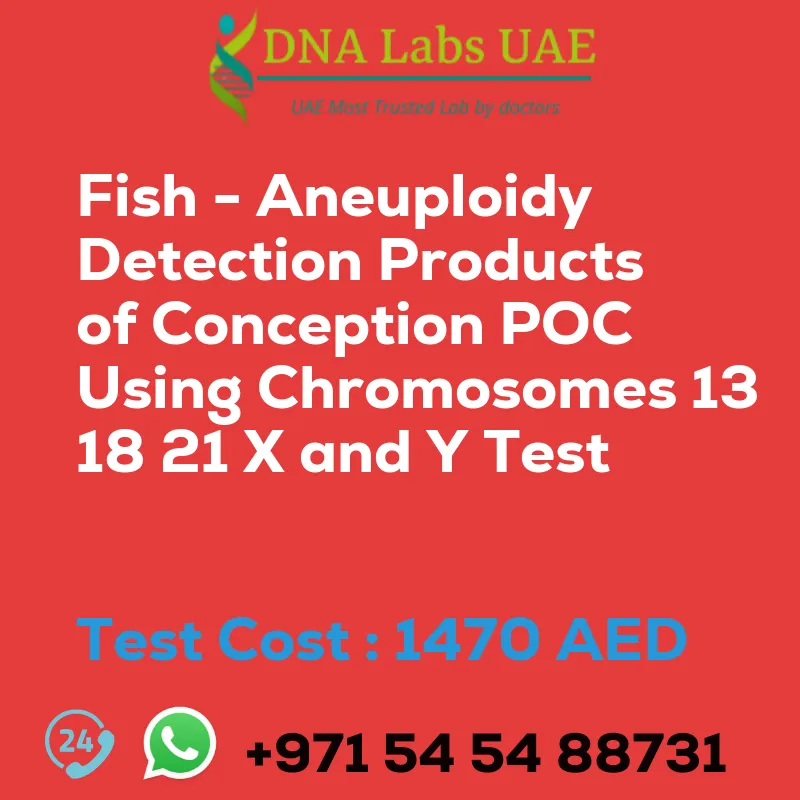FISH – Aneuploidy Detection Products of Conception (POC) Using Chromosomes 13, 18, 21, X, and Y Test
At DNA Labs UAE, we offer the FISH – Aneuploidy Detection Products of Conception (POC) test to detect chromosomal abnormalities in products of conception. This test is specifically designed to detect abnormalities in chromosomes 13, 18, 21, X, and Y, which are commonly associated with genetic disorders such as trisomy 13, trisomy 18, trisomy 21, and sex chromosome abnormalities.
Test Details
The FISH (Fluorescence In Situ Hybridization) – Aneuploidy Detection POC test is a diagnostic tool used to detect chromosomal abnormalities in products of conception. Products of conception refer to the tissue that is expelled from the uterus during a miscarriage or termination of pregnancy.
The test involves using fluorescently labeled DNA probes that specifically bind to the target chromosomes of interest. These probes emit a fluorescent signal when they bind to their complementary sequences on the chromosomes. By analyzing the presence or absence of the fluorescent signals, the test can determine if there are any extra or missing copies of the targeted chromosomes.
The FISH – Aneuploidy Detection POC test can provide valuable information about the chromosomal status of the products of conception, helping to determine the underlying cause of a miscarriage or assess the risk of recurrence in future pregnancies. It is typically performed on a small sample of the tissue obtained from the products of conception.
It is important to note that the FISH test is just one of several diagnostic tools available for detecting chromosomal abnormalities. Its results may need to be confirmed using other methods, such as karyotyping or chromosomal microarray analysis. Additionally, the test may not detect all types of chromosomal abnormalities, and further genetic testing may be necessary for a comprehensive evaluation.
Test Components and Cost
The FISH – Aneuploidy Detection Products of Conception (POC) test is priced at AED 1470.0. The test components include:
- Sample Condition: Submit placenta (villi) or fascia lata, diaphragm, tendon, skin, tissue from internal organs (if fresh), chest wall cartilage (particularly if macerated) in normal saline. Ship immediately at 18-22°C. Formalin fixed specimens are not acceptable.
- Chromosome & FISH Analysis Requisition Form (Form 17): Duly filled form is mandatory.
- Report Delivery: Sample daily by 4 pm; Report in 4 days.
Doctor and Test Department
The FISH – Aneuploidy Detection Products of Conception (POC) test is conducted under the supervision of a gynecologist. The test is performed in the Cytogenetics department.
Pre Test Information
Prior to taking the FISH – Aneuploidy Detection POC test, it is mandatory to fill out the Chromosome & FISH Analysis Requisition Form (Form 17).
Symptoms and Diagnosis
The FISH – Aneuploidy Detection POC test is recommended for individuals who have experienced a miscarriage or undergone a termination of pregnancy. It helps in diagnosing chromosomal abnormalities in the products of conception.
Conclusion
The FISH – Aneuploidy Detection Products of Conception (POC) test offered by DNA Labs UAE is a valuable diagnostic tool for detecting chromosomal abnormalities. It provides important information about the chromosomal status of the products of conception and helps in determining the underlying cause of a miscarriage or assessing the risk of recurrence in future pregnancies. However, it is important to note that the FISH test is just one of several diagnostic tools available, and its results may need to be confirmed using other methods for a comprehensive evaluation.
| Test Name | FISH – ANEUPLOIDY DETECTION PRODUCTS OF CONCEPTION POC USING CHROMOSOMES 13 18 21 X and Y Test |
|---|---|
| Components | |
| Price | 1470.0 AED |
| Sample Condition | Submit Placenta (villi) or Fascia lata, diaphragm, tendon, skin, tissue from internal organs (if fresh), chest wall cartilage (particularly if macerated) in normal saline. Ship immediately at 18-22?\u00f8C. Formalin fixed specimen not acceptable. Duly filled Chromosome & FISH analysisRequisition Form (Form 17) is mandatory. |
| Report Delivery | Sample Daily by 4 pm; Report 4 days |
| Method | FISH |
| Test type | Genetic Disorders |
| Doctor | Gynecologist |
| Test Department: | CYTOGENETICS |
| Pre Test Information | Duly filled Chromosome & FISH analysisRequisition Form (Form 17) is mandatory. |
| Test Details |
The FISH (Fluorescence In Situ Hybridization) – Aneuploidy Detection Products of Conception (POC) test is a diagnostic tool used to detect chromosomal abnormalities in products of conception, which refers to the tissue that is expelled from the uterus during a miscarriage or termination of pregnancy. This specific FISH test is designed to detect aneuploidies, which are abnormalities in the number of chromosomes, in chromosomes 13, 18, 21, X, and Y. These chromosomes are commonly associated with certain genetic disorders, such as trisomy 13 (Patau syndrome), trisomy 18 (Edwards syndrome), trisomy 21 (Down syndrome), and sex chromosome abnormalities. The test involves using fluorescently labeled DNA probes that specifically bind to the target chromosomes of interest. These probes emit a fluorescent signal when they bind to their complementary sequences on the chromosomes. By analyzing the presence or absence of the fluorescent signals, the test can determine if there are any extra or missing copies of the targeted chromosomes. The FISH – Aneuploidy Detection POC test can provide valuable information about the chromosomal status of the products of conception, helping to determine the underlying cause of a miscarriage or to assess the risk of recurrence in future pregnancies. It is typically performed on a small sample of the tissue obtained from the products of conception. It is important to note that the FISH test is just one of several diagnostic tools available for detecting chromosomal abnormalities, and its results may need to be confirmed using other methods, such as karyotyping or chromosomal microarray analysis. Additionally, the test may not detect all types of chromosomal abnormalities, and further genetic testing may be necessary for a comprehensive evaluation. |








